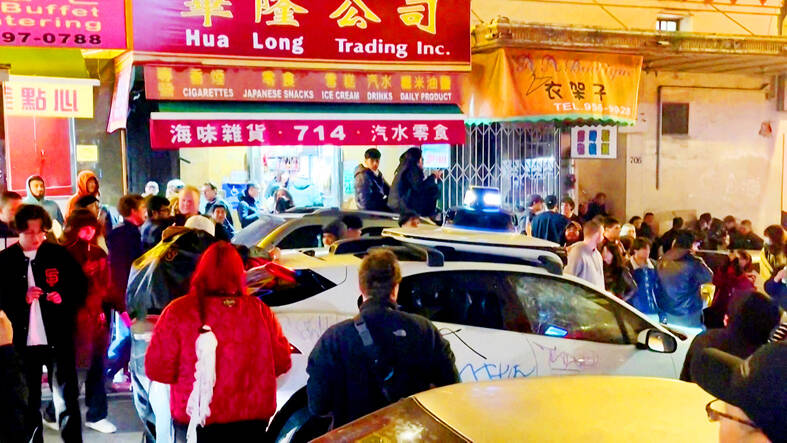A self-driving taxi was smashed and set aflame on the streets of San Francisco over the weekend, company representatives said on Sunday.
The autonomous vehicle from tech firm Waymo LLC, owned by Google parent company Alphabet Inc, was targeted by a group of people apparently carrying fireworks from ongoing Lunar New Year celebrations.
No one was in the car and there were no reported injuries from the Saturday night incident, Waymo said.

Photo: Michael Vandi via Reuters
“A crowd surrounded and vandalized the vehicle, breaking the window and throwing a firework inside, which set the vehicle on fire,” a Waymo spokesperson told AFP.
“The vehicle was not transporting any riders,” the spokesperson added. “We are working closely with local safety officials to respond to the situation.”
Images posted on social media showed the white Jaguar stopped in a crowded street in San Francisco’s Chinatown, where celebrations were ongoing.
Several people dressed in black are shown breaking the windows, including one using a skateboard.
Other videos show the vehicle with its windows broken and fireworks exploding inside, before it catches fire and shoots out a massive plume of smoke.
After the fire goes out, the car appears largely destroyed.
San Francisco has been the main testing ground for gradual piloting of autonomous vehicles in the US, though they have sometimes been the target of vandals and also raised safety concerns.
A few days before Saturday night’s incident, a cyclist was injured after being hit by a Waymo car, local media reported.
Cruise LLC, another autonomous vehicle company and owned by automotive giant General Motors Co, indefinitely suspended its activities at the end of October last year after several accidents sparked a crackdown by California regulators.
Tesla Inc’s “autopilot” feature has also come under scrutiny, facing accusations the marketing of the feature has oversold its actual abilities.
“Autopilot” was involved in 736 accidents and 17 deaths since 2019, according to a Washington Post report analyzing data from the National Highway Traffic Safety Administration, a regulator.

CHIP WAR: Tariffs on Taiwanese chips would prompt companies to move their factories, but not necessarily to the US, unleashing a ‘global cross-sector tariff war’ US President Donald Trump would “shoot himself in the foot” if he follows through on his recent pledge to impose higher tariffs on Taiwanese and other foreign semiconductors entering the US, analysts said. Trump’s plans to raise tariffs on chips manufactured in Taiwan to as high as 100 percent would backfire, macroeconomist Henry Wu (吳嘉隆) said. He would “shoot himself in the foot,” Wu said on Saturday, as such economic measures would lead Taiwanese chip suppliers to pass on additional costs to their US clients and consumers, and ultimately cause another wave of inflation. Trump has claimed that Taiwan took up to

SUPPORT: The government said it would help firms deal with supply disruptions, after Trump signed orders imposing tariffs of 25 percent on imports from Canada and Mexico The government pledged to help companies with operations in Mexico, such as iPhone assembler Hon Hai Precision Industry Co (鴻海精密), also known as Foxconn Technology Group (富士康科技集團), shift production lines and investment if needed to deal with higher US tariffs. The Ministry of Economic Affairs yesterday announced measures to help local firms cope with the US tariff increases on Canada, Mexico, China and other potential areas. The ministry said that it would establish an investment and trade service center in the US to help Taiwanese firms assess the investment environment in different US states, plan supply chain relocation strategies and

Hon Hai Precision Industry Co (鴻海精密) is reportedly making another pass at Nissan Motor Co, as the Japanese automaker's tie-up with Honda Motor Co falls apart. Nissan shares rose as much as 6 percent after Taiwan’s Central News Agency reported that Hon Hai chairman Young Liu (劉揚偉) instructed former Nissan executive Jun Seki to connect with French carmaker Renault SA, which holds about 36 percent of Nissan’s stock. Hon Hai, the Taiwanese iPhone-maker also known as Foxconn Technology Group (富士康科技集團), was exploring an investment or buyout of Nissan last year, but backed off in December after the Japanese carmaker penned a deal

WASHINGTON POLICY: Tariffs of 10 percent or more and other new costs are tipped to hit shipments of small parcels, cutting export growth by 1.3 percentage points The decision by US President Donald Trump to ban Chinese companies from using a US tariff loophole would hit tens of billions of dollars of trade and reduce China’s economic growth this year, according to new estimates by economists at Nomura Holdings Inc. According to Nomura’s estimates, last year companies such as Shein (希音) and PDD Holdings Inc’s (拼多多控股) Temu shipped US$46 billion of small parcels to the US to take advantage of the rule that allows items with a declared value under US$800 to enter the US tariff-free. Tariffs of 10 percent or more and other new costs would slash such